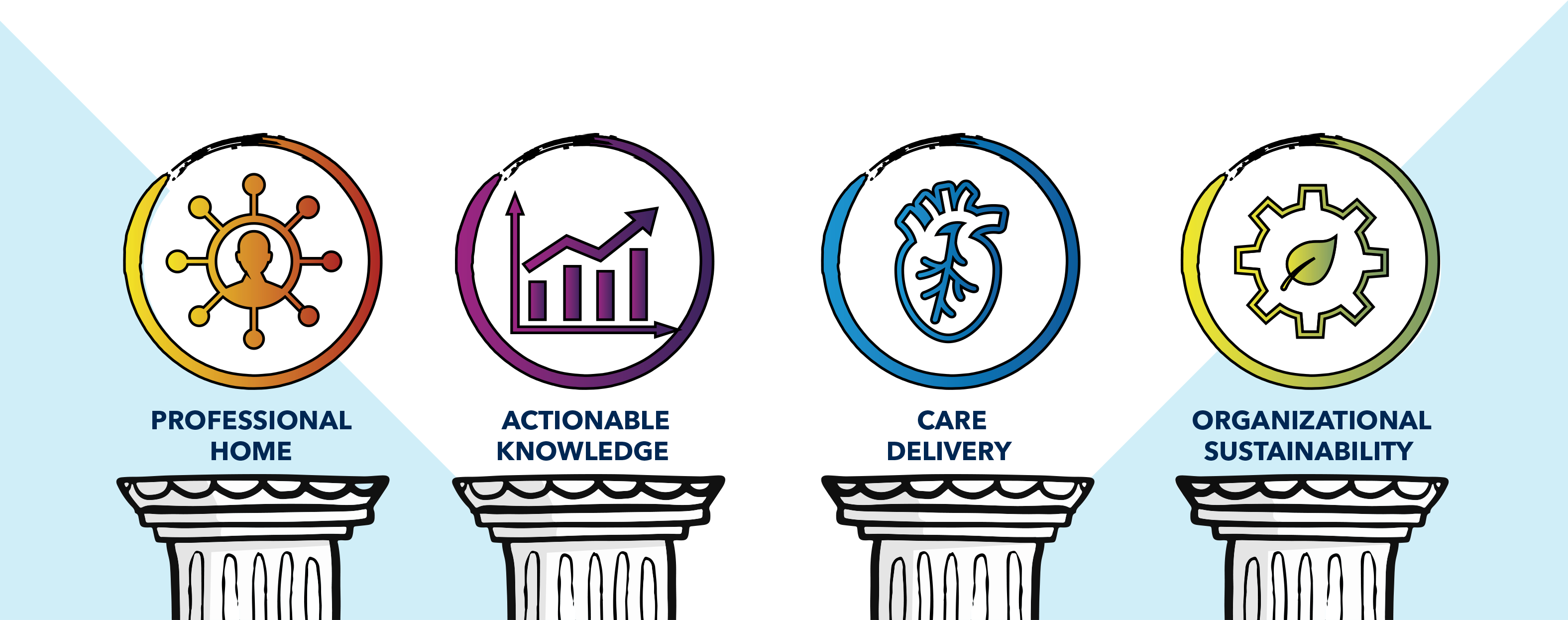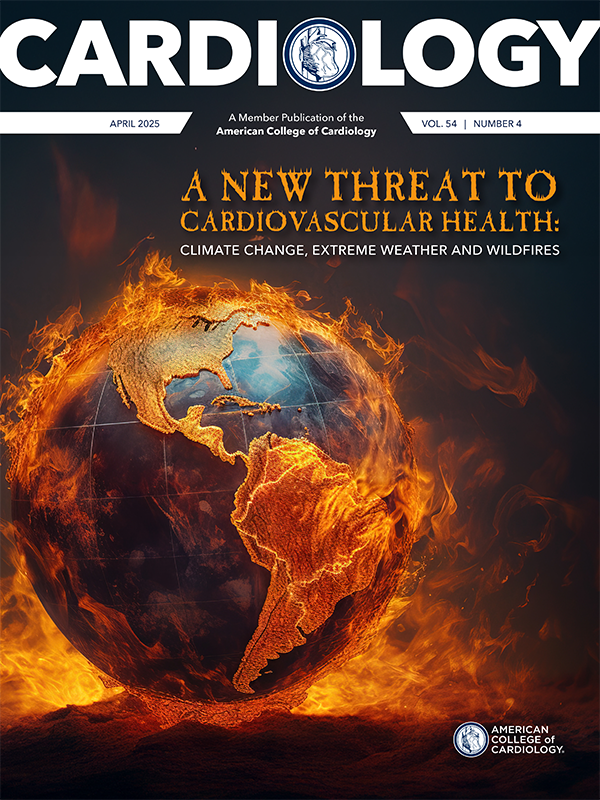Feature | Driving Change, Building Community: How ACC Chapters Shape the ACC Experience

ACC Chapters are instrumental in driving action at the state level and are at the forefront of helping to deliver on the College's Mission to transform cardiovascular care and improve heart health for all. Their dedicated work on the ground – fostering community, developing new leaders, ensuring equitable access to care, and advocating for policies that protect both clinicians and patients – directly supports the College's goals and are playing a leading role in shaping the future of the profession.
The 2024 State of the States Report highlights the substantial and ongoing contributions of Chapters over the course of the past year in delivering actionable knowledge, fostering community, advancing quality, equity and value of care, and much more.
Fostering Community
In 2024, ACC Chapters continued to lead the way in fostering strong, vibrant communities of cardiovascular professionals within their respective states. For countless members, the local Chapter is more than just a resource – it's the heart of the ACC experience. It's where leadership opportunities take shape, connections are made and specialized learning thrives, all while creating a space for members to grow and engage on a deeper level.
This spirit of community was evident throughout 2024, with Chapters driving meaningful initiatives and connecting clinicians.
The Ohio Chapter launched the Fellows in Training (FIT) Grand Rounds Series: Career Development. The series provided fellows across the state with valuable insights to help shape their careers. Lunchtime grand rounds hosted by various fellowship programs covered essential topics like job selection, employer expectations, contract negotiation, personal finance for young doctors, and transitioning to early career stages. This program continues to build on the Chapter's ongoing efforts, such as the annual FIT Bootcamp, to educate and support fellows as they prepare for the next step in their professional journeys.
In Florida, the FIT Section Leadership built the Florida FIT Leadership Academy, a 10-month virtual course offering firsthand insights from Chapter leaders on key topics like mentoring, successful communication, care gaps, changing clinical management, early career challenges, women in cardiology, burnout and more.
The Maryland Chapter partnered with the German Cardiac Society to build the Developing International Leadership Program. This year-long program, supported by both societies and the German government, brought together FITs from Maryland and Germany to learn more about career planning, fundamental management basics, ethical considerations and personal well-being. It also created an opportunity for mentorship and international networking.
The Missouri Chapter expanded its Early Career Cardiology Research Grant Program to include a mentorship opportunity for high school students. As part of the program, Early Career Cardiology Research Grant Recipients are paired with high school students interested in potentially pursuing a career in research and/or medicine.

Making Knowledge Actionable
Annual Chapter meetings and other live events continue to be important forums for the sharing of knowledge, best practices and the latest innovations and trends.
Over the last two years, in-person Annual Meetings have largely returned to pre-pandemic levels, with several Chapters like Nebraska, Washington, Wisconsin and North Carolina/South Carolina recording their highest attendance ever. There were also a couple "firsts" to celebrate, with the Arkansas Chapter holding its first in-person meeting since COVID and the Hawai'i Chapter holding its first stand-alone meeting since its inception.
Other examples of successful meetings, offering unique opportunities to highlight cutting-edge industry advancements, hear from ACC leaders and top experts on the latest research, and engage in dynamic discussions on emerging trends, abound.
The Kansas and Missouri Chapters linked up for the first time in more than a decade for an annual symposium that included a keynote tackling health care disparities and a special FIT Research Showcase featuring more than 50 poster presentations. Alabama and Mississippi also teamed up for a joint meeting, bringing together cardiovascular clinicians from both states for networking and learning.
In Iowa, the Chapter continued to rotate its annual meeting location with the goal of increasing access to all members throughout the state and creating equity in opportunity for all three fellowship programs to be recognized and represented. The 2024 meeting was held in Des Moines for the first time in years and included several new interactive presentation formats, including a great debate, allowing for increased engagement and bi-directional discussions.
Outside of annual meetings, the Rhode Island Chapter's Spring Cardiovascular (CV) Team Symposium amplified attendance, grew industry support and drew attention to some of the biggest trends and updates in cardiovascular medicine.
The Colorado Chapter's Heart Failure Symposium, in partnership with the University of Colorado, and endorsed by the Heart Failure Society of America, was also a huge success, drawing the largest crowd to date. Additionally, its CV Team fall symposium provided an important opportunity for CV Team members to focus on cutting-edge cardiology and cardiothoracic surgery advancements.

Advancing CV Care
Chapters also continued to lead in advancing quality, equity and value in cardiovascular care – a key Strategic Pillar of the ACC. From local health initiatives to advocating for patient access, their efforts are driving meaningful change and helping shape a more equitable future for heart health.
For example, the Alaska Chapter's "HART" initiative, in partnership with the Boys and Girls Clubs of Alaska, continues to make a difference by teaching hands-only CPR, automated external defibrillators awareness and blood pressure education in communities around the state. In the past year, Chapter members were able to bring training to more remote locations, while also using the program as a successful example of community education in meetings with lawmakers.
Advancing CPR education and AED training were also a focus of the Tennessee and Georgia Chapters. Thanks to efforts by the Tennessee Chapter, in collaboration with the American Heart Association, the Governor signed landmark legislation requiring schools to have AEDs in school and sports facilities. In Georgia, the Chapter helped to spearhead successful legislation requiring sudden cardiac emergency response plans and AEDs in all public schools.
In other advocacy wins, the California Chapter advocated and achieved a landmark victory with the passage of Proposition 35, a measure ensuring that managed care organization tax dollars directly support medical reimbursement to physicians and hospitals providing care to Medi-Cal patients, safeguarding the future of patient care to the vulnerable population.
In Indiana, the Chapter's public health and advocacy committees sponsored two resolutions at the Indiana State Medical Association convention in September, both of which were passed and added to the 2025 agenda. The resolutions focus on advocating for legislation to remove noncompetes for subspecialists and raising awareness of increased cardiovascular risk among the South Asian population.
Health equity – a key component of transforming cardiovascular care for all – was also a focus for many chapters. More than 200 members and community leaders attended the Nevada Chapter's 2024 Food is Medicine Symposium, which was co-branded by the University of Nevada Reno School of Medicine, Renown Health System and the Food Bank of Northern Nevada and funded in part by a grant with the ACC's Women in Cardiology (WIC) Section.
In North Carolina, the Chapter provided grant funding for a local community health worker program designed to pilot test early interventions that can help reduce readmission in women with or at high risk for developing postpartum hypertension. Other chapters, like Colorado and Kansas, incorporated critical discussions around health equity as part of their annual meeting programming.
Partnerships and collaborations were also an important part of advancing care transformation. The Michigan Chapter partnered with the Michigan Society of Echocardiography to form the Michigan Cardiovascular Imaging Consortium to improve quality and elevate standards of imaging across the state of Michigan.
In Pennsylvania, the Chapter's WIC Committee joined with three other Chapters and the ACC's Prevention and Reproductive Health and Cardio-Obstetrics Member Sections to create a Postpartum Hypertension Clinic Development Toolkit to help clinicians, health care teams and health systems develop postpartum hypertension care programs for individuals with a recent hypertensive disorder of pregnancy.

The Road Ahead For ACC Chapters
Heading into 2025, ACC Chapters are looking to build on the success of the past year and continue their vital work to help the College achieve its Vision of a world where science, knowledge and innovation optimize patient care and outcomes.
On the docket, plans to continue to grow meeting attendance and engagement of members from different practice types and career stages; increase leadership and mentorship opportunities; build FIT, WIC and CV Team communities; advocate for health policies that protect patient access to care; foster collaborations and partnerships with ACC Chapters, Sections and others on transformative efforts to improve care; and so much more.
The state of the Chapters is strong, and ACC is privileged to have such a deep roster of talented, motivated and enthusiastic Chapter leaders who will ensure the future of the College for years to come.

This article was authored by Hima Vidula, MD, MS, FACC, ACC BOG Chair (2024-2025) and David Winchester, MD, FACC, ACC BOG Chair (2025-2026).
Keywords: Cardiology Magazine, ACC Publications, Health Equity, Quality of Health Care

